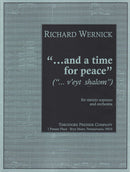| 作曲者 | Richard Wernick (b. 1934) |
| タイトル | ... and A Time for Peace |
| サブタイトル | ... V'Eyt Shalom - for Mezzo Soprano and Orchestra - Score |
| 出版社 | Theodore Presser・プレッサー |
| 楽器編成(詳細) | Piano, Percussion 1, Percussion 2, Percussion 3, Piccolo, Timpani, Tenor 1, Tenor 2, Tenor 3, Tenor 4, Soprano, Bassoon 1, Bassoon 2, Bassoon 3, Celesta, Cello, Bass Clarinet, Violin 1, Violin 2, Trumpet 1, Trumpet 2, Trumpet 3, Viola, Clarinet 1, Clarinet 2, Flute 1, Flute 2, Contrabassoon, English Horn, Contrabass, Horn 4, Oboe 1, Oboe 2, Horn 1, Horn 2, Horn 3, Harp |
| 品番 | HLTHE41641148 |
| 演奏時間 | 20:00 |
| 出版年 | 1997年 |
| 出版番号 | 416-41148 |
The text of the first movement, "K'ta'im mi k'ta'vim atikim" ("fragments of ancient writing") is a collection of verses from various Middle Eastern historical sources that found their way into the apocalyptic visions of Hebrew, Christian, and Muslim scriptures. This movement, sung in Hebrew, is the broadest of the three in conception. It employs a large orchestral palette as well as a quasi-operatic treatment of the voice. The images of the destruction of the universe, despite the ultimate vision of a paradise to come, are terrifying.
After the apocalyptic visions of the first movement, the second movement, "Interludio del Paradiso" is taken from the second book of Dante's "Commedia." The text, an excerpt of the first Canto, expresses the idea that all things in the universe derive from divine perfection, and that this can best be seen in the way that the universe is made to resemble God. This section is sung in Italian.
The third and last movement, "mi Kohelet" ("from Ecclesiastes") is sung in the original Hebrew. In these verses are also found a particular sense of order: a season and a time for everything "under the sun." It is one of the most beautiful texts in the Old Testament. In just sixteen lines an enormous range of human actions, reactions and emotions are expressed, culminating in "a time for war and a time for peace." It is an immortal text that cries out for musical setting. In addition to its powerful emotive impact, it is expressed in the simplest form of poetic strophe.
1. K'ta'im mi k'ta'vim atikim
2. Interludio dal Paradiso
3. mi Kohelet



